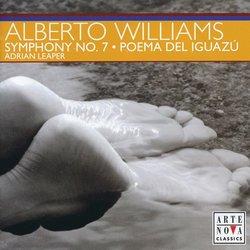A great lesser known composer comming to light slowly but su
P. Alvarez | Killeen, Texas United States | 10/24/2008
(5 out of 5 stars)
"Extremely little is known about this
great argentine composer, and so is
also very little known about his music,
so what I am wrting here is based on
my personal impression of the very little
music that I have heard by this gentleman.
First of all both works in this recording
are world premiere recordings. The seventh
symphony "Eterno Reposo" was composed in 1937
"Eterno Reposo" is actually Spanish for "Requiem Aeternam".
The symphony is in the usual four movements and
by the tittle of the movements one cannot help to
think of ancient Egypt. The first movement: The Pyramid(La Piramide)
opens loud and gradually slows down, and brings to mind
an andante. The second movement: Dancers of Amun (Danzarinas de Amon)
To those that are not familiar with egyptian mythology, Amun is
the 'father of all winds' the egyptian version of Zeus. The
second movements opens on a soft celesta melody that as it
goes on it is join by pizzicati strings, soft rolls on
suspended cymbals, and later taken by the harp, and after
all strings join in on what sounds like a lovely tango melody.
The third movement: "Femele Crotales players" (Tocadoras de Crotalos),
again this movements brings the percussion to the spotlight, this
time the castanets in the opening. The finale "Eternal Rest"
(Eterno Reposo) opens slowly on strings and then a little past
the middle of the movement a loud orchestral burst is heard
that is started by the trombones and later taken by the whole
orchestra, then a lovely fanfare is heard on trumpets, horns,
snare drum and timpani. The language of the Seventh Symphony
is post- romantic, thou lived well into the 20th century
Williams was educated in 19th century Europe, he was a student
of Cesar Franck. I can relate Williams to R. Strauss and S.
Rachmaninov who were born and educated in the 19th century
but lived well into the 20th century. The "Poema Del Iguazu"
is far more European than Latin-American in sound. it brings
to mind more the Rhine, or the Moldau, but I guess that in
its peace of mind and tranquility might relate to the Iguazu,
or perhaps in its majestic flowing. On this recording
the Orquesta Filarmonica de Gran Canaria under the baton
of Adrian Leaper do an outstanding job."


 Track Listings (8) - Disc #1
Track Listings (8) - Disc #1